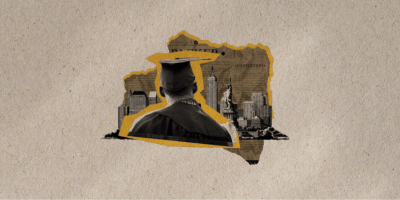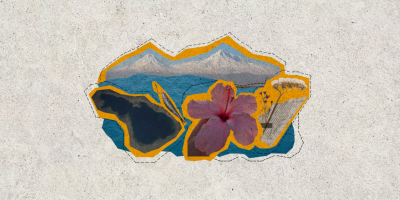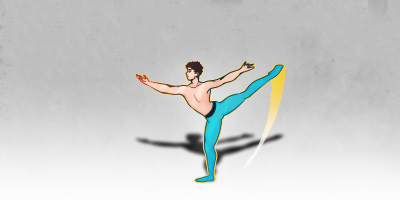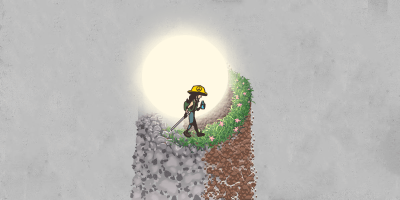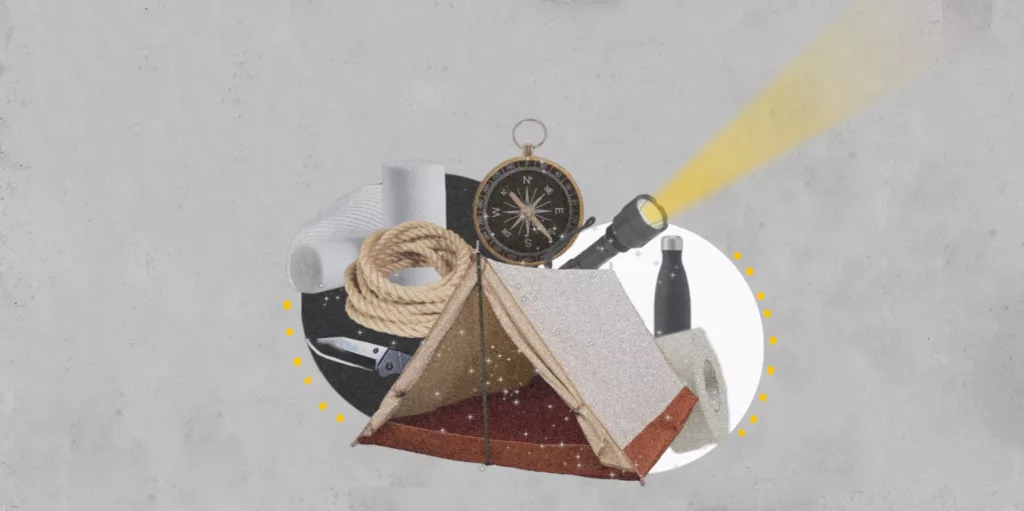
A pocket knife, two polyester ropes, a compass, a flashlight, a water bottle, medical tape, and a bandage are some of the essentials a person needs to survive for weeks in the wild.
The full chance of survival, however, comes with training and knowledge alongside the backpack. This is the Golden Rule that scouts from Spitak’s Young Men’s Christian Association (YMCA) repeat in every class while learning to stop wounds from bleeding, save lives, blend with nature and become a part of it.
The 2020 Artsakh War put its damaging trace on a group of children in the small town of Spitak. Within a night, they grew up and took responsibility to protect themselves. After the war, they took scouting and its purpose more seriously. Young scouts acquire vital knowledge and skills that every person needs, especially in a conflict zone like Armenia. These children from seven to 14 appreciate the role of scouting.
The school system often fails to offer students first aid classes and any other survival skills. In 2022, the Armenian Red Cross Society held a First Aid (FA) introductory course only for 16,000 students. That is less than four percent of the students in public and private schools in Armenia. So YMCA Spitak is a platform where children and teenagers can enhance their awareness and learn two main skills: first aid and civil defense.
The scouts’ curriculum is full of FA lectures and practices. In the first semester, they cover only the basic principles of FA. Scouts learn how to protect themselves and an injured person’s life by making informed decisions, not to make the situation worse and immediately contacting for help. After the first semester, they learn more specific skills to utilize during disasters.
Knowledge about FA is vital for scouts, but the YMCA Scouting is not only about that. It aims to help young people achieve their physical and intellectual potential and gain information to survive wild conditions and disasters.
“If you’re a real scout, you study First Aid only to be prepared because the real fun comes when you train so you can even survive in The Hunger Games,” said Nrane Markosyan, the leader of the scouting program. To survive the Hunger Games, the program leaders teach them the scouting principles.
For example, the moss grows on the north surface of the tree because they like wet conditions. Ants build their colonies facing the south. Knowing these facts, scouts can navigate in nature without a compass. They also start noticing details and become more attached to nature.
The rabbit comes up out of its hole, runs around the tree, and back down to its hall. Every scout knows to tie “the most trusted” knot. They practice tying different knots so many times that they develop their muscle memory.
Turning the flashlight on three shots, three long and three more short times, they call for help. Learning Morse code is the coolest thing for every scout as they not only can save a life but also send secret messages to each other.
Hiking is the backbone of scouting; you need to be physically prepared for long walks and climbing. “The brightest scouting memories relate to hiking,” said Lily Petrosyan, the head organizer of YMCA Spitak Scouting 2023. “Hiking is a checkup for my students as they finally get a chance to demonstrate all the skills they learned.” Spitak is near mountains and woods, so the leaders take their young peers hiking every month. Nothing can be more enjoyable than to set fire and cook their food on it all by themselves.
YMCA Spitak’s scouts have more skills and knowledge than the rest of their peers. However, they would not succeed if they did not have supportive and professional leaders. Two head organizers of the YMCA Spitak Scouting 2023 program, Markosyan and Petrosyan, are still in high school, but they have years of scouting experience.
Petrosyan and Markosyan joined the scouting program from the ages of 9 and 11. They are excited to transfer their knowledge to the next generations. For them, scouting is a way to appreciate nature and relax from the stressful academic environment.
Becoming a leader comes with a pocket full of responsibilities and hard work. Petrosyan and Markosyan went through a long process before becoming head organizers. After having five years of experience, they were promoted as trainees. YMCA Spitak cooperates with its European counterparts and always sends its best trainees for training.
In August 2022, Petrosyan attended Cevi Zurich YMCA’s Scouting Camp in Switzerland to gain more experience. “It was the first time I had real responsibilities as I was traveling all alone,” said Petrosyan. The camp was in the Alps, so she had to endure the harsh weather conditions. “I got the taste of survival,” she continued. She believes that she would not have survived if she did not have her scouting skills and experience.
The scouts respect and trust their young leaders as they perceive them as role models. Leaders motivate and teach them to take care of the environment. The children follow their leaders and stand with them.
Though the scouting program is tense, the leaders apply interesting methods to make it fun and accessible for all participants. The program always starts with an active outdoor game. “Games have an important role in our curriculum. Here we train and teach young scouts through games,” said Vatche Isanians, a Peace Corps volunteer at YMCA Spitak. The scouts acquire information better through games and remember it.
Games also help them develop their critical thinking skills, become more creative, and learn how to work in teams. “Teamwork is a life skill,” he continued. “It helps scouts overcome their difficulties together.” Unfortunately, Armenian schools lack the opportunities to foster this skill. Scouts learn to exchange ideas and form stronger friendships while working in a team.
Having said that, scouting is not only about survival skills but also about the right mentality and discipline. Teenagers learn that they need to be self-reliant and, at the same time, follow instructions. “In Armenia, the son is the ‘king’ of the house,” mentioned Isanians. “Parents don’t teach them to follow orders, so they become arrogant and do not want to prepare for the army.”
The initial purpose of scouting worldwide was to prepare boys for the army. In YMCA Spitak, the idea still prevails. YMCA Spitak’s boy scouts are ready not only physically but also mentally. They know that in the army, like in scouting, they need to abide by the rules, put their ego down, and support each other to achieve a better result.
Scouts have all the skills they need, which can be applied to their service in the army. YMCA Spitak has many brilliant ex-scouts who took part in the 2020 War. During the war, they used all the FA skills they learned from scouting, and thanks to that, they survived. They also could properly navigate in the right direction without devices.
Scouting guarantees that the future generation is ready to face catastrophes, as they train to survive during war and in peace. But above all, at YMCA Spitak, scouting is a way for children and teens to exchange ideas, have fun, make mistakes, and learn from them.





